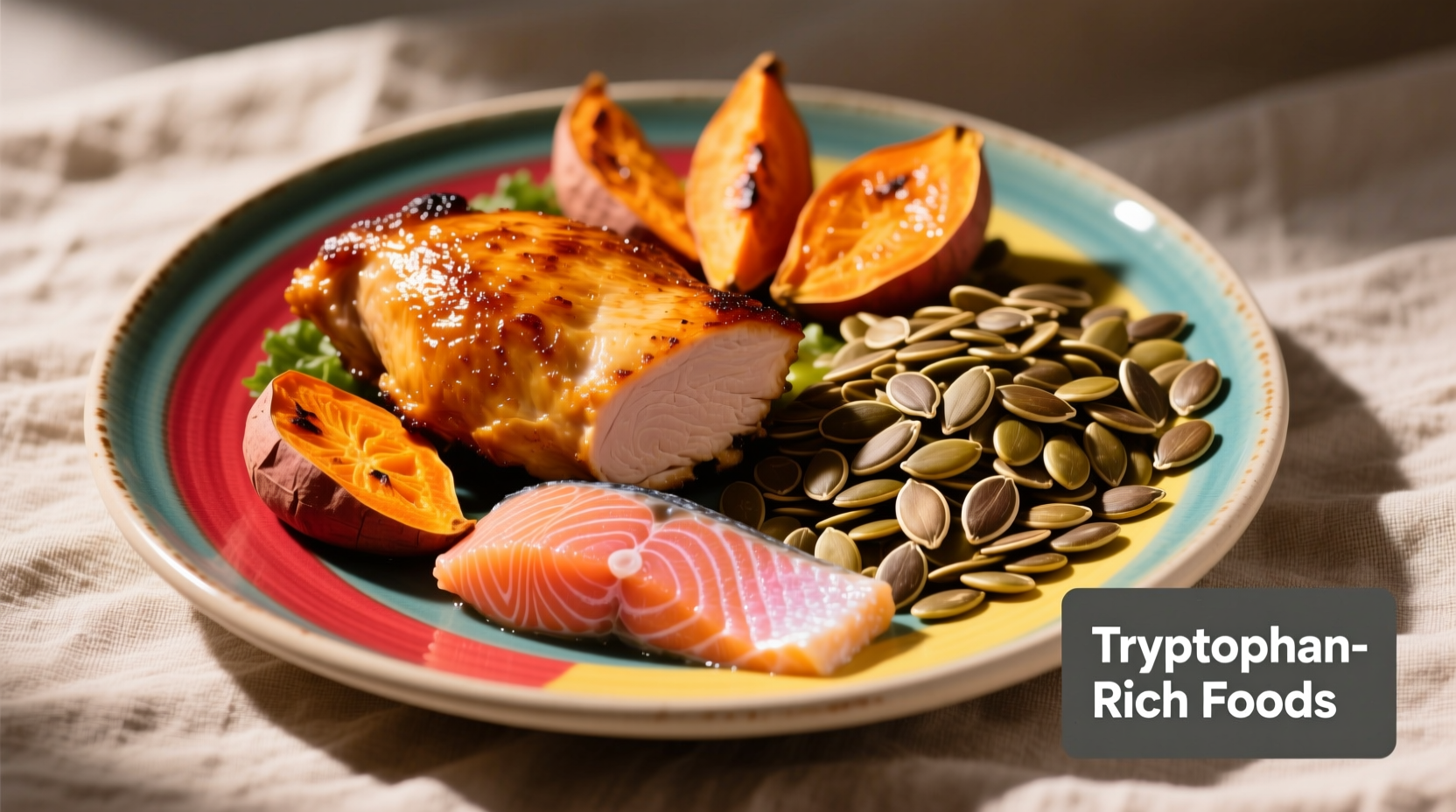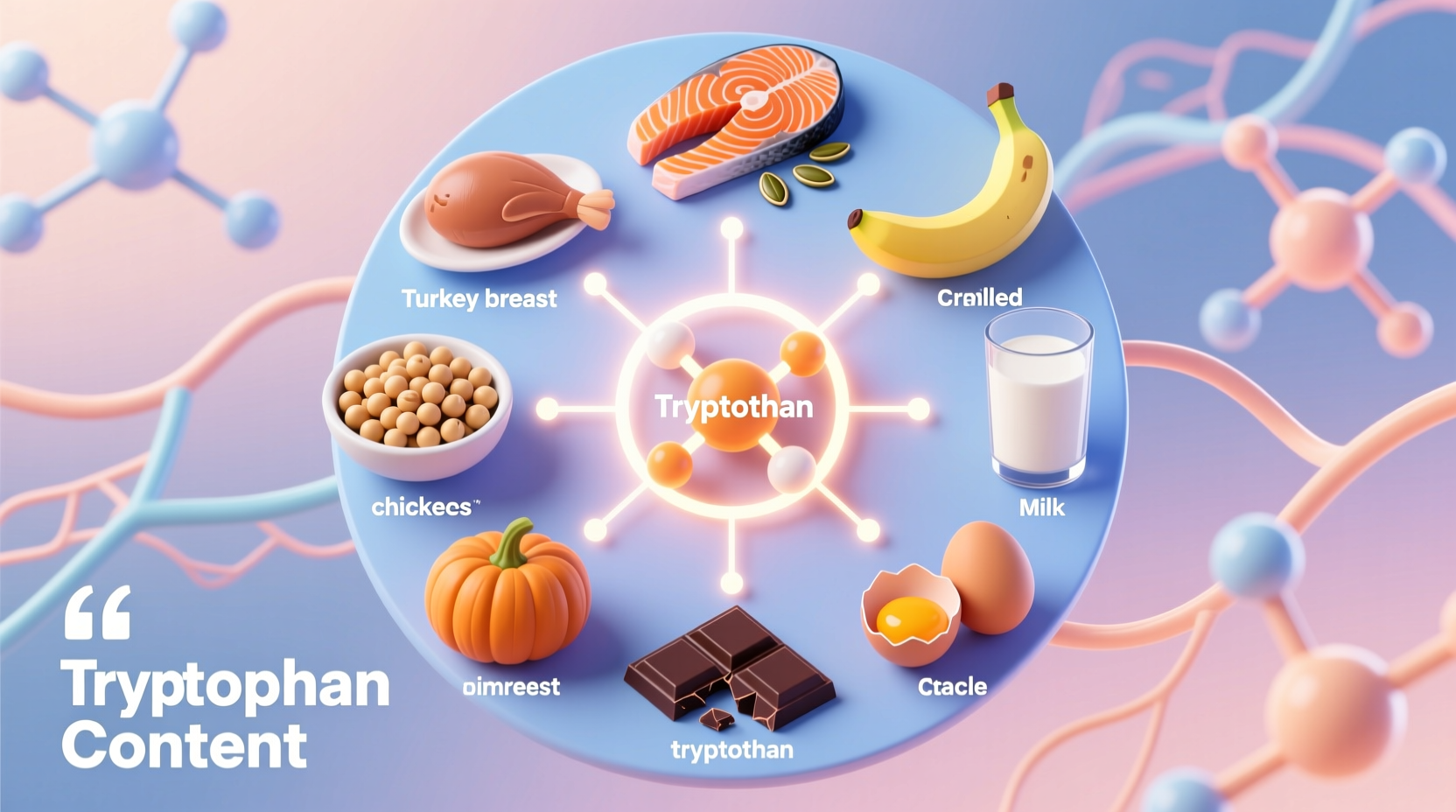When you're searching for what foods contain tryptophan, you're likely looking for natural ways to support your mood, sleep, and cognitive function. Tryptophan serves as the building block for serotonin and melatonin—critical neurotransmitters that regulate emotional wellbeing and sleep-wake cycles. Unlike supplements, whole food sources deliver tryptophan alongside complementary nutrients that enhance absorption and utilization.
Top Tryptophan Food Sources by Category
Animal Proteins
Animal-based foods generally provide the highest concentrations of bioavailable tryptophan. The amino acid profile in these proteins supports optimal absorption:
- Turkey: 303mg per 3-ounce serving (not just Thanksgiving!)
- Chicken: 284mg per 3-ounce serving
- Eggs: 101mg per large egg (yolk contains nearly half)
- Salmon: 249mg per 3-ounce serving
- Beef: 205mg per 3-ounce serving
Plant-Based Proteins
For vegetarians and vegans, these plant sources deliver substantial tryptophan alongside fiber and phytonutrients:
- Soybeans: 357mg per cup (edamame provides 214mg per cup)
- Pumpkin seeds: 235mg per ounce (also rich in magnesium)
- Chia seeds: 175mg per ounce
- Lentils: 181mg per cooked cup
- Almonds: 105mg per ounce
Dairy and Fermented Options
Fermentation enhances tryptophan bioavailability in these traditional foods:
- Cottage cheese: 145mg per cup
- Greek yogurt: 127mg per 7-ounce container
- Miso: 110mg per 2-tablespoon serving
- Chevre (goat cheese): 95mg per ounce
| Food | Serving Size | Tryptophan (mg) | Additional Benefits |
|---|---|---|---|
| Soybeans | 1 cup | 357 | Complete protein, fiber, isoflavones |
| Turkey | 3 oz | 303 | Vitamin B6, selenium, zinc |
| Pumpkin seeds | 1 oz | 235 | Magnesium, zinc, healthy fats |
| Salmon | 3 oz | 249 | Omega-3s, vitamin D, selenium |
| Chia seeds | 1 oz | 175 | Fiber, calcium, omega-3s |
Maximizing Tryptophan Absorption from Foods
Simply consuming tryptophan-rich foods isn't enough—the body requires specific conditions for optimal conversion to serotonin. Research from the NIH Office of Dietary Supplements shows that pairing tryptophan sources with complex carbohydrates improves brain uptake by facilitating insulin release, which clears competing amino acids from the bloodstream.
Practical pairing examples:
- Walnuts + apple slices
- Chia pudding made with almond milk
- Salmon + quinoa bowl with roasted vegetables
- Scrambled eggs with sweet potato hash
Avoid high-protein meals immediately before sleep, as the amino acid competition may reduce tryptophan's calming effects. Instead, enjoy protein-rich foods earlier in the day and opt for lighter carbohydrate-containing snacks in the evening to support melatonin production.
Common Misconceptions About Tryptophan Foods
Many believe turkey makes you sleepy due to tryptophan, but this is only partially true. The post-Thanksgiving drowsiness comes primarily from overeating carbohydrates alongside turkey, not the tryptophan alone. In fact, research published in Nutrients shows that carbohydrate consumption significantly enhances tryptophan's conversion to serotonin.
Another myth suggests that tryptophan supplements work better than food sources. However, whole foods provide co-factors like vitamin B6, magnesium, and zinc that facilitate tryptophan metabolism—something isolated supplements lack. The USDA FoodData Central database confirms that food matrices enhance nutrient bioavailability compared to isolated compounds.

When Food Sources May Not Be Enough
While most people can meet their tryptophan needs through diet, certain conditions may require professional guidance. Individuals with chronic insomnia, depression, or specific genetic variations affecting serotonin production might benefit from targeted approaches under medical supervision. The Mayo Clinic notes that food-based approaches should always come before supplementation for general wellness.
Remember that tryptophan works within a complex nutritional ecosystem—magnesium deficiency, for example, can impair the enzyme that converts tryptophan to serotonin. A balanced diet featuring diverse whole foods remains the most effective strategy for supporting your body's natural biochemistry.
Practical Implementation Guide
Start incorporating tryptophan-rich foods with these simple strategies:
- Breakfast boost: Add pumpkin seeds to oatmeal or smoothies (14g provides 10% of daily needs)
- Lunch enhancement: Include grilled chicken or chickpeas in salads (5oz chicken meets 35% of daily requirement)
- Smart snacking: Pair walnuts with banana for afternoon energy regulation
- Dinner focus: Choose salmon or lentils as protein sources 3-4 times weekly
For optimal results, combine these foods with sunlight exposure during daytime hours—natural light enhances serotonin production and regulates circadian rhythms. This holistic approach delivers better outcomes than focusing on tryptophan alone.











 浙公网安备
33010002000092号
浙公网安备
33010002000092号 浙B2-20120091-4
浙B2-20120091-4